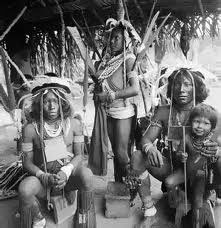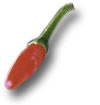By Captain Mayne Reid
Editor’s Note: The Maroons were escaped slaves in Jamaica who hid in the infamous cockpit country of jungles and sinkholes. The Maroons were famously known for inventing jerk pork, but they also liked their spicy pepper-pot soup.

“This white gentleman has not eaten breakfast,” said Cubina, as they came up. “Well, Quaco! What have the men got in their cutacoos?”
The individual thus appealed to was a jet black negro of large dimensions, with a grove yet quizzical cast of countenance. He appeared to be a sort of lieutenant: perhaps the “Little John” of the party.
“Well, worthy captain,” answered he, saluting the yellow hunter with a somewhat awkward grace; “I believe there’s enough, one thing with another—that be, if the gentleman has got a good appetite, and he’s not too nice about what he eats.”
“What is there? Let me see!” interrupted Cubina, as he proceeded to inspect the panniers. “A ham of wild hog barbecued,” continued he, turning out the contents of a cutacoo. “Well, that to begin with—you white gentry are rather partial to our barbecued hog! What else! A brace of soldier crabs. So far good; ah! better still, a pair of ramier pigeons, and a wild guinea fowl. Who carries the coffee and sugar?”
“Here, captain,” cried another of the cutacoo men, throwing his pannier to the ground, and drawing out several bags which contained the necessary materials for coffee-making.
“A fire, and be quick!” commanded Cubina, evidently the captain of this black band.
At the word given a tinder was struck, dry leaves and branches quickly collected, and a sparkling, crackling fire soon blazed upon the ground. Over this was erected a crane—resting horizontally on two forked sticks-which soon carried a brace of iron pots suspended in the blaze.
With so many cooks, the process of preparing the meat for the pots was very short and quick. The pigeons and guinea fowl were singed as fast as feathers would burn; and then being “drawn and quartered,” were flung in torn fragments into the largest of the pots. The soldier crabs shared the same fate; and some pieces of the wild hog ham. A handful of salt was added, water, a few slices of plantain, eddoes, calalue, and red capsicum —all of which ingredients were supplied from the cutacoos.  A strong fire of dried sticks soon brought the pot to a furious boil; and the lieutenant Quaco—who appeared also to act as chef de cuisine—after repeatedly testing the contents, at length declared that the pepper-pot was ready for serving up.
A strong fire of dried sticks soon brought the pot to a furious boil; and the lieutenant Quaco—who appeared also to act as chef de cuisine—after repeatedly testing the contents, at length declared that the pepper-pot was ready for serving up.
Dishes, bowls, cups, and platters made their appearance—all being shells of the calabash, of different shapes; and as soon as Herbert and the captain were helped to the choicest portions of the savoury stew, the remainder was distributed among the men: who, seating themselves in groups over the ground, proceeded to discuss the well known viand with an avidity that showed it was also their breakfast.
The pepper-pot was not the sole dish of the déjeuner. Pork steaks, cut from the carcass of the freshly-slain boar, were added; while plantains and “cocoa-fingers,” roasted in the ashes, contributed a substitute for bread not to be despisingly spoken of.
The second pot boiling over the fire contained the coffee; which, quaffed from the calabashes, tested as fine as if sipped out of cups of the purest Sévres porcelain.
In this “al-fresco” feast the poor captive was not forgotten, but was supplied among the rest—the colossal Quaco administering to his wants with an air of quizzical compassion.
From The Maroon, or, Planter Life in Jamaica, by Captain Mayne Reid. Cassells Illustrated Family Paper, London, January 18, 1862.




